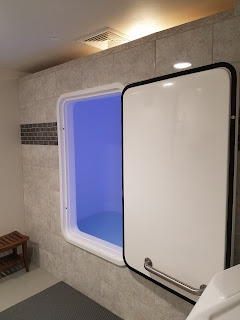Float News and Updates for November
Do yourself a favor, and release the tension from your shoulders. You should also unclench your jaw, and release your tongue from the roof of your mouth.
We hold a lot of our stress physically, and there’s a feedback loop between how our bodies feel, and the mental state we’re in. When your body is tense, you feel tense; when your body is relaxed, you feel relaxed.

It’s a time of tension right now for all of us, and unless you pay close attention, that feedback loop is ripe to spiral out of control.
Floating allows your body to relax completely, and starts shifting your mind to feel the same. It’s just one of the reasons the world feels a little calmer after a float. Give your body a break — your brain will thank you.
Floating Pro-Tip: Stretch Yourself Into a Deeper Float
Have you ever felt restless at the start of your float? Entering a float tank is a drastic change in environment, and it can take our bodies (and brains) a bit of time to adapt. Stretching a little before entering the tank — as well as the first few minutes of your float — can prime your body to help you unwind quicker, and float deeper.
How does stress affect us?
We live in an incredibly demanding moment in history. Have you ever wondered how the constant hustle and bustle of the modern world is treating your body and brain? Terribly, it turns out. These two ~4 minute TedTalks cover just a few of the ways our busy lives can lead to major health issues and decreased brain function. How stress affects your brain. How stress affects your body.
But don’t fret – you can counteract these negative effects anytime you need with periods of mindful relaxation. Floating can be one of the best places to find the peace and quiet required to do so. Even a single float has been shown to help immensely with relaxation, and a regular float practice can help you keep your calm even in the most taxing times.
The Science of Floating and Stress
As a floater, you’re likely already keenly aware of floating’s ability to relieve you of tension. But have you ever wondered about just how floating works its magic on our bodies and brain? Check out this summary of some of the exciting research that’s been done surrounding surrounding sensory reduction and anxiety: How Floating Dissolves Stress

Float Fact:
The first float tanks were a LOT different from what we use today. The earliest horizontal tanks had no salt – to stay afloat in the foot deep water, these float pioneers would bend their legs at the knee to support their lower body and use a breath technique known as “dolphin breathing” to maintain the buoyancy of their upper body. This involved holding their breath for longer than normal and then doing a quick exhale and rapid inhalation, so that the lungs remained mostly full.
Listen for your body’s attempts to communicate with you. Pacing, clenched fists, restless legs, tossing and turning in bed – all of these are methods your body can use to let you know you have tension built up, and all of them can contribute to you feeling tense moment to moment.
It’s easy for messages from your body to get lost in the sea of stimulus from the outside world. You may end up ignoring them entirely unless you set aside some time to pay attention.
And if you need a calm, comfortable, and disruption-free place to do so?
